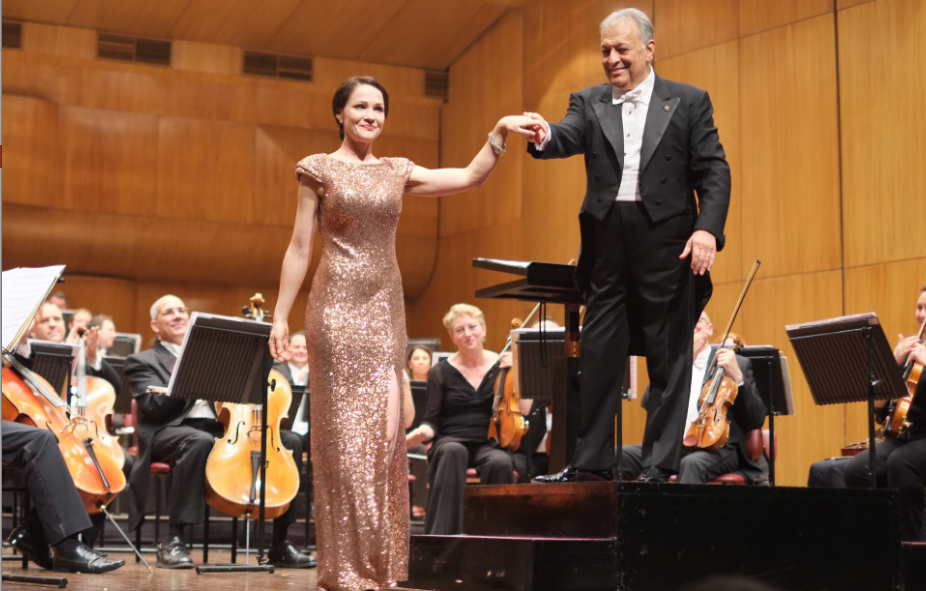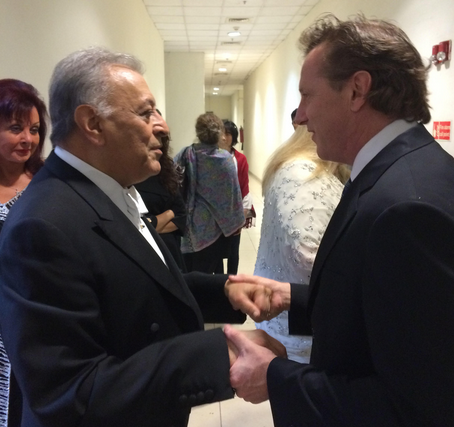JLN Stadium, New Delhi
October 31, 2015
Zubin Mehta isn’t just a man of words, he backs them up with deeds as well. Two years ago he told Sydney and Melbourne audiences that we had something special and cherishable in the Australian World Orchestra, the crack ex-pat band brought together under the inspired leadership of conductor Alex Briger. Now he seems determined to prove that fact to the world, beginning with his homeland, by helming them on a weeklong three-city tour of India. And what was true in Australia held fast in Mumbai, Chennai and finally New Delhi where, visa issue notwithstanding, I was fortunate enough to catch them playing a former weightlifting stadium on a sultry Saturday night.
“Zubin Live in Concert”, my ticket proclaimed, stating loud and clear that for Indian fans of Western classical music there is only one Maestro Mehta, returning to the city after a 15-year absence but clearly far from forgotten. And with many of the 2,500-strong audience taking their seats up to an hour ahead of schedule, there was definitely a bit of a buzz going around. Well-heeled Indians milled and chatted; brightly turbaned Sikhs rubbed shoulders with ladies in elegant saris; the glitterati mingled with the suited and booted. In fact, so sociable was the affair that the announcer made a special point of asking us not to wander about during the performance.
 Mehta with Greta Bradman (photo by Paul Ghica)
Mehta with Greta Bradman (photo by Paul Ghica)
The first standing ovation happened before a note of music had been played as the 79-year-old Maestro took the stage. Once all bums were back on terra firma (and the squeaking of the stadium seats had died down) we were off, with a finely paced account of “Leonora Three”, the most brooding and dramatically complex of Beethoven’s curtain raisers for his oft-revised Fidelio. Mehta gave it a Brahmsian weight and smoothness, the AWO leaping into action like the composer’s operatic libertarian protagonists come to life. Sensitive to the tricky stadium acoustic, Mehta kept the pacing steady ensuring blend, balance and build all landed with aplomb, not the least of which was the atmospherically rendered offstage trumpet fanfare coutesy of Lukas Beno (Principal Trumpet with the Gewandhaus Orchestra).
Arriving on the platform in a stunning copper-sequined backless gown, rising-star soprano Greta Bradman completed the relatively brief first half with a trio of arias showing the considerable breadth of repertoire revealed on her recent chart-topping Decca debut album. Mozart’s Der Hölle Rache showed a slight nervousness, though the coloratura was secure and the delivery passionate. Bradman’s voice is a bit bigger than many Queens of the Night, a distinct advantage in houses of this size, and that paid off as well in her cheeky, fun-loving interpretation of Rossini’s Una Voce Poco Fa. Bradman’s ornamentation is a delight and Mehta’s choice of tempo was just right – a notch up on Bonynge’s more staid pacing on the recital disc. The Maestro even found room to share a little joke with his diva mid-aria.
The real treat, however, was the soul-stirring account of Leonora’s D’amor sull’ali rosee from the final act of Verdi’s Il Trovatore. Bradman’s beefy middle extends downwards to a rich lower register and up to a ringing top. Mehta, a seasoned Verdian if ever there is one, gave her just the right degree of support, teasing out the odd string phrase and keeping it down when needed to allow Bradman’s exquisite pianissimo top to melt hearts. Despite her talent for the baroque and the bel canto, on this showing, I’d say that Verdi soprano is where she is headed.
 Mehta and the AWO’s Alex Briger after the final concert
Mehta and the AWO’s Alex Briger after the final concert
After showing off the Classical and early Romantic, the second half was devoted to the full flowering of the Viennese tradition with a pitch-perfect account of that most sunny of Brahms’ four symphonies, the Second in D Major. Again, Mehta’s instinct for his orchestra and his acoustic ensured that his carefully-judged tempi gave Brahms’ compelling ideas the maximum elbow room to communicate. His slightly deliberate approach gave the first movement’s big romantic theme plenty of air to breath and blossom and likewise the sophisticated contrapuntal development was heard to best effect. The AWO string section really came into its own here, sweet-toned yet strong. The wind section too (led by new Artistic Director of ANAM, Nick Deutsch on oboe and Alison Mitchell, Principal Flute with the Scottish Chamber Orchestra) landed every blow alongside the poignant commentary of Brahms’ three trombones.
The warm nostalgic themes of the second movement, spreading from cellos and basses, up through the woodwind, and finally taken up by the full orchestra, led into the serious-minded Elgarian meditation that is the reflective Andante, before the perky wind and racing strings of the Tchaikovskian Scherzo broke like sunlight dappling a Bohemian forest grove. The Finale was full of thrilling dramatic ideas, Mehta’s crisp articulation making it feel pacier than I suspect it actually was. Again, inner detail was always clear, adding to the sum of the parts. The dynamic contrasts were highly effective here, the broadening out before the noble second subject tugging at the heartstrings with just the right degree of Viennese passion. The emotional heft, always on the tasteful side of schmaltzy, clearly pleased the players, many of whom were wreathed in smiles throughout. A racy, powerful push into the final bars ensured yet another standing ovation before a festive Dvořák Slavonic Dance as encore saw Mehta positively pirouetting on the podium in a crowd-pleasing display that sent his audience off whistling into the steamy Delhi night. With the AWO conquering the Indian subcontinent, the only question I guess is where next? China? Africa? I’d say the sky’s the limit.











Comments
Log in to join the conversation.